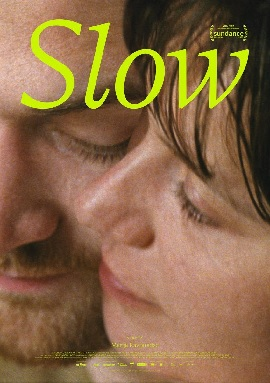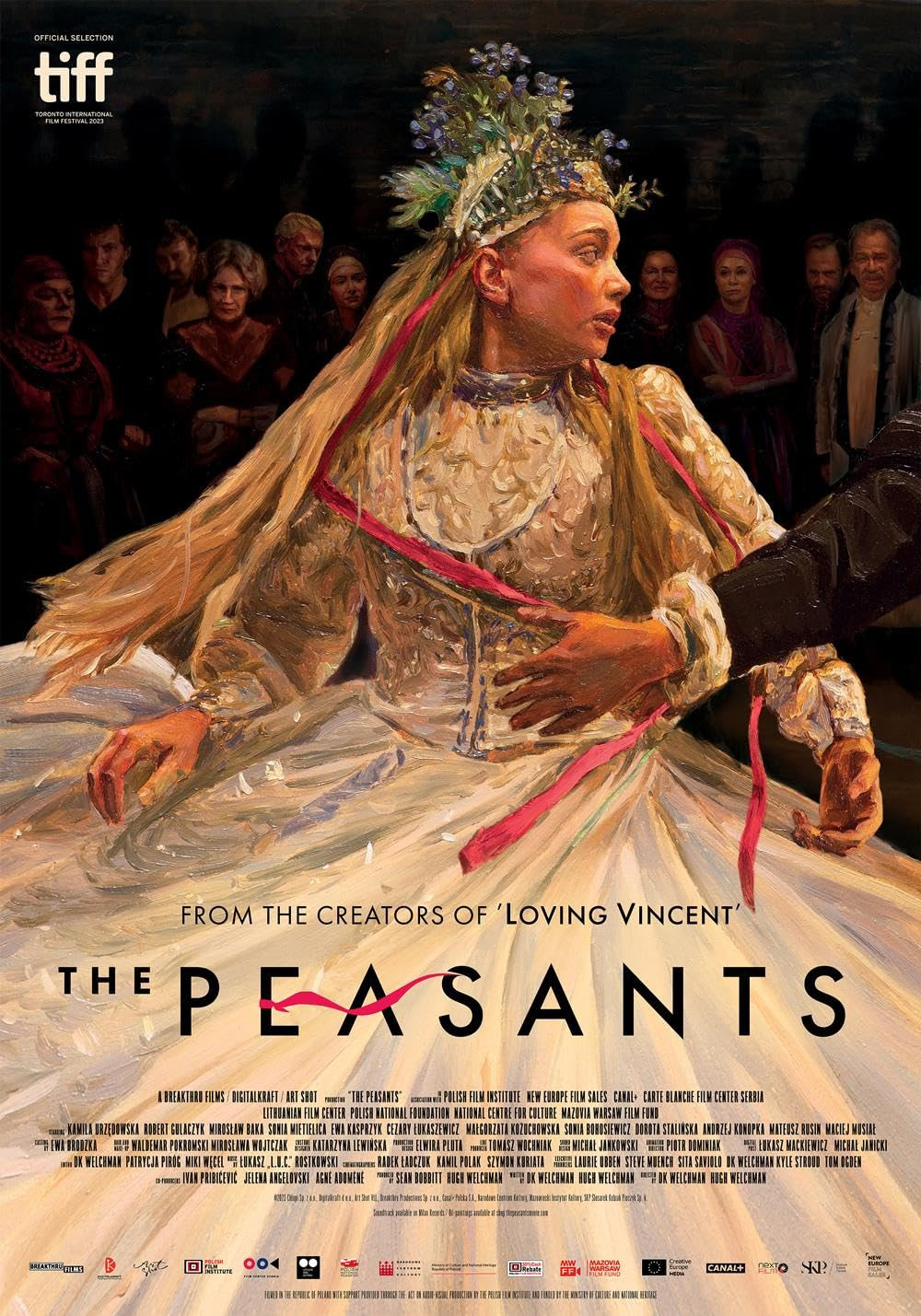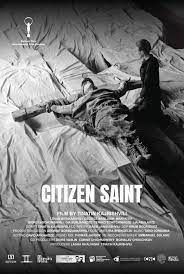Here are my assessments of the 20 films from Eastern Europe. I’ve been very fortunate to see more than half (11of 20) of these films.
Number of Countries Participating this year: 20
Number of Countries That Have Participated in the
Past: All 24 Eastern European countries have participated at
least three times.
Who’s Missing?: RUSSIA is
boycotting the Oscars for the second year in a row in protest of…. alleged
“disrespect to Russia” for their unprovoked invasion of neighboring Ukraine
(?!). BELARUS, a Russian ally, is also sitting out after sending films
from 2018-2020.
Sadly, AZERBAIJAN, which had a strong film year, is
also not participating though their decision has nothing to do with
Russia/Ukraine.
The most surprising absence however is KOSOVO, a
country that is typically obsessed with proving their nationhood (it’s still
only recognized by half of UN Members, after declaring independence from Serbia
in 2008). Kosovo has submitted every year since they were recognized by AMPAS
in 2014 and this year the Kosovo Cinematography Center received four
submissions, including frontrunner “The Land Within”, which won the Best First
Feature award at Tallinn Black Nights 2022. Director Fisnik Maxville condemned
the decision not to send any film to represent Kosovo. I’ve said it once and
I’ll say it again. Most of the 92 submissions have little chance at being
nominated, and I don’t understand why a country like Kosovo would refuse to
send an award-winning film, and get some free publicity for their hard-working
filmmakers.
FRONTRUNNERS:
1. ![]() UKRAINE-
“20 Days in Mariupol” (Letterboxd: 4.2)
UKRAINE-
“20 Days in Mariupol” (Letterboxd: 4.2)
2. ![]() ROMANIA-
“Do Not Expect Too Much of the End of the World” (3.8)
ROMANIA-
“Do Not Expect Too Much of the End of the World” (3.8)
These two frontrunners have charmed audiences in very
different ways. UKRAINE’s “20 Days in Mariupol” is a devastating, gritty
documentary, documenting the human tragedies and war crimes against civilians
that took place during the first two weeks of the Russian siege of the city of
Mariupol (Маріуполь) in
February 2022. Tens of thousands of Ukrainian civilians were killed. Last year,
I predicted that goodwill towards Ukraine would help “Klondike” make the
shortlist....but "Klondike" was a very difficult film to appreciate. “Mariupol” is also difficult to watch, but it’s certainly more accessible and has the best scores on
IMDB (8.7) and Letterboxd (4.2). I think it will be nominated in Documentary
Feature and shortlisted in International Film. One possible hurdle: the version
I saw was almost entirely in English….but it appears to be on the AMPAS list?
ROMANIA’s 3-hour comedy is Radu
Jude’s fourth try at Oscar, and arguably the best-reviewed of his four films (yes,
I know “Bad Luck Banging” won the Golden Bear, but it was quite divisive). Critics and
audiences really seem to like it and it’s high-profile enough to get voters to
watch it (which made all the difference last year). It’s on the bubble.
DARK HORSES:
3. ![]() BULGARIA- “Blaga’s Lessons” (3.5)
BULGARIA- “Blaga’s Lessons” (3.5)
4. ![]() CZECH
REPUBLIC - “Brothers” (3.4)
CZECH
REPUBLIC - “Brothers” (3.4)
5. ![]() POLAND- “The Peasants” (3.8)
POLAND- “The Peasants” (3.8)
6. ![]() LITHUANIA- “Slow” (3.8)
LITHUANIA- “Slow” (3.8)
BULGARIA
In A
Nutshell: A surprising thriller about an elderly victim of fraud who
decides to seek revenge.
Pros: It’s a
fantastic and original film with an Oscar-worthy performance by Eli Skorcheva,
who came out of cinematic retirement to make the movie. Stepan Komandarev was
shortlisted once before, so this committee appreciates his work.
Cons: As last
year proved, being a fantastic Bulgarian film isn’t enough to make the shortlist
if nobody sees it. Bleak.
CZECH REPUBLIC
In A
Nutshell: Based on a true story, this is a thriller about a pair of
brothers who go on a violent journey to escape Communist Czechoslovakia
Pros: This Cold
War drama looks like a real “traditional” Oscar choice…even the creaky “Charlatan”
made the shortlist a few years ago and “Brothers” is far more exciting.
Cons: While
Oscar likely won’t care that these brothers are very controversial figures in
their native Czech Republic, nobody is talking about it. This was the last film
on the list to premiere meaning few have seen it.
LITHUANIA
In A
Nutshell: A quirky romantic drama about a dancer and a sign-language
interpreter with dramatically different sex drives
Pros: Critics
and audiences really seem to like it. Sundance play showed it has broad appeal
with U.S. audiences. Asexuality has rarely been explored in film.
Cons: This is
a small drama from a small country and is much more intimate the films Oscar
usually shortlists.
POLAND-
In A
Nutshell: A beautifully animated film set in rural 19th century
Poland, by the makers of “Loving Vincent”
Pros: Good
reviews and a very high profile. Based on the new rules, the important thing is
getting the film seen…and the film has buzz and a U.S. released well-timed for
December. “Loving Vincent” got an Oscar nomination and the film has overall
good reviews.
Cons: The reviews
are good but people I know have been less enthusiastic. As far as I know, an
animated fiction feature has never been shortlisted or nominated….They may feel
this should be rewarded in Animated Feature.
A STRONG SHOWING:
7. ![]() MACEDONIA- “Housekeeping for Beginners” (3.5)
MACEDONIA- “Housekeeping for Beginners” (3.5)
8. ![]() ESTONIA - “Smoke Sauna
Sisterhood” (3.9)
ESTONIA - “Smoke Sauna
Sisterhood” (3.9)
9. ![]() ARMENIA-
“Amerikatsi” (3.6)
ARMENIA-
“Amerikatsi” (3.6)
10. ![]() SLOVAKIA-
“Photophobia” (3.3)
SLOVAKIA-
“Photophobia” (3.3)
These four countries are praying for a miracle.
“Housekeeping for Beginners” actually has really great reviews for its comedy-drama about a lesbian reluctantly forced into motherhood by her partner….but most of its festival play has come from LGBT sidebars.
Finally, we have the
lighthearted “Amerikatsi”, a crowdpleaser from Armenia about an Armenian-American
who accidentally ends up in a 1950s Soviet prison when he accepts an offer for emigres to help rebuild
the homeland after WWII. This is a U.S. co-production which got a domestic
release and it treats very serious subjects with humor…but that may lead to
viewers thinking the film is too light.
MIDDLE OF THE PACK:
11. ![]() BOSNIA-HERZEGOVINA- “Excursion” (3.3)
BOSNIA-HERZEGOVINA- “Excursion” (3.3)
12. ![]() GEORGIA- “Citizen Saint” (3.4)
GEORGIA- “Citizen Saint” (3.4)
13. ![]() HUNGARY-
“Four Souls of Coyote” (3.5)
HUNGARY-
“Four Souls of Coyote” (3.5)
14. ![]() SLOVENIA- “Riders” (3.5)
SLOVENIA- “Riders” (3.5)
In a field of 90-odd films, these four films are
likely to be forgotten. I’ve seen “Citizen Saint” (Karlovy Vary), a B&W
arthouse film from GEORGIA about a mysterious man who appears to be the
reincarnation of a missing religious icon. “Citizen Saint” starts off
sloooow…..and I’m willing to bet that many viewers won’t have the patience to
finish it. That’s a shame, because the film has one of the most powerful
endings in this group and it gave us a lot to talk about…But one of my friends
left the room for 20 minutes in the middle and said she felt like she didn’t
miss anything. From the former Yugoslavia, come two quiet dramas…“Excursion”
from BOSNIA-HERZEGOVINA (Locarno) is about how rumors and lies about sex
affect a teenage girl, her school and her entire community. It’s a great story
but I don’t predict it will break out. Set
in 1999, SLOVENIA’s “Riders” is
an overlong coming-of-age story and road movie, with a mostly unlikable set of
characters. It didn't find anything about it interesting, although apparently critics liked it better than I did. “Four Souls of Coyote” from HUNGARY
(Annecy) is a very well-made 2D animated film about Native
American mythology, with environmental issues prominently in the background. But animated films have an
uphill battle in this category and the film may be unfairly compared to
neighboring Poland’s “The Peasants” which has more innovative and beautiful
animation. I found it to be a solid and well-made film, mixing a number of Native legends, but not particularly memorable.
BETTER LUCK NEXT YEAR:
15. ![]() SERBIA- “The Duke and the Poet” (2.9)
SERBIA- “The Duke and the Poet” (2.9)
16. ![]() MOLDOVA- “Thunders” (3.5)
MOLDOVA- “Thunders” (3.5)
17. ![]() ALBANIA- “Alexander” (2.8)
ALBANIA- “Alexander” (2.8)
18. ![]() MONTENEGRO- “Sirin” (2.6)
MONTENEGRO- “Sirin” (2.6)
19. ![]() CROATIA- “Traces” (2.8)
CROATIA- “Traces” (2.8)
20. ![]() LATVIA- “My Freedom” (2.7)
LATVIA- “My Freedom” (2.7)
As I say every year, I’m
very happy when smaller countries like Albania and Moldova send films and I’m
always excited to see them. It gives me an opportunity to take a tour around
the world and revisit countries I’ve travelled to (I’ve been to all 20 countries
in this group except Poland). And it gives smaller film industries the
opportunity to get their films seen in Hollywood.
These six films are here
to represent their countries but they won’t be making it to the next round, in
large part because American audiences won’t understand or relate to them. ALBANIA
has selected a documentary – “Alexander” - for the first time. The subject
of the documentary, Alexander Gruda, is an extraordinary individual who
hijacked a warship to neighboring Yugoslavia during the Communist era alongside some friends, his wife, and his infant daughter who was killed by enemy
fire. It’s an old-fashioned “talking head” doc and although Alexander (now
working at a NYC hotel in anonymity) and his wife have a fascinating story, the
documentary doesn’t caption any of the participants and it’s often confusing
who characters are and where they are located. MOLDOVA, participating
for only the fourth time, selected a new low-budget drama set in the 1990s
called “Thunders”, about two children whose parents oppose their friendship.
One of the only reviews I can find describes it as a “non-linear” film with a
weak script.
From the former
Yugoslavia, we have three dramas –“Sirin”, “Traces” and “The Duke and the Poet”.
CROATIA’s “Traces” is a dull drama about a female anthropologist dealing
with the death of her father. Having won only three small tech awards at
Croatia’s national film festival, it was a surprise pick by the usually edgy
Croatians (I loved their last three films) and “Traces” has one of the lowest
Letterboxd and IMDB scores in the Eastern European group. I saw it and it’s
well-acted but really not very interesting. MONTENEGRO’s “Sirin” was the
only film submitted this year to represent the smallest country in Eastern Europe...but - unlike neighboring Kosovo- Montenegro sees the value of participation so here they are. The film is fairly interesting to watch but suffers from a really troubled script.
The subject of the film seems to jump around and a lot of questions go
completely unanswered. I read a synopsis of the film after watching
it, and there were some key points that weren’t explained in the film at all. SERBIA
is represented by “The Duke and the Poet”, an obscure effort about 19th
century history which is unlikely to resonate with U.S. audiences. The film is
supposed to be pleasant enough, but had no festival play and has been compared
to a production for television.
Finally, LATVIA has
selected “My Freedom”, based on the life of a Polish-Latvian woman who helped
advocate for an end to Soviet rule in the late 1980s. Her personal life is
interesting and there’s a lot (too much?) of interesting folk music….but too
much of the film concentrates on the intricacies of Soviet Latvia’s burgeoning
political parties and it’s just not likely to hold the interest of a
non-Latvian. I think AMPAS audiences will be bored.
Genres: We have
three documentaries (Albania, Estonia, Ukraine) plus an odd docu-drama
(Slovakia)…..and two animated films (Hungary, Poland). We also have three
“dramatic comedies” (Armenia, Macedonia, Romania) and one thriller (Czech
Republic. The other ten are straight-up dramas.
I’ve Already Seen: 11- Albania, Armenia, Bulgaria, Croatia,
Estonia, Georgia, Hungary, Latvia, Montenegro, Slovenia and Ukraine. My
favorite so far is Bulgaria’s “Blaga’s Lessons”.
Film I’m Most Excited To See: “Housekeeping
for Beginners” (Macedonia).
Number I Predicted Correctly: Ugh….Only
5 out of 20 (Bosnia, Bulgaria, Estonia, Romania and Slovenia) In my
defense, my picks for Albania and Hungary were delayed to next year. And
several countries picked very late releases.
Big Four Festivals: Very few!
· Cannes
and Berlin- No Films
·
Sundance-
Estonia (Best Director,
Documentary), Lithuania (Best Director, Fiction), Ukraine (Best Documentary,
Audience Award)
·
Venice- Macedonia, Slovakia
Women Directors- 7 films were directed or co-directed by women: All three directors from the Baltic Republics: Anna Hints (Estonia), Marija Kavtaradzė (Lithuania), and Ilze Kunga-Melgaile (Latvia) plus Una Gunjak (Bosnia-Herzegovina), Tinatin Kajrishvili (Georgia), Dubravka Turic (Croatia), and DK Welchman (co-director, Poland).
Oldest and Youngest Directors- 58-year
old Milorad Milinković (Serbia) is the oldest of the group, while 32-year old Marija
Kavtaradze (Lithuania) is the youngest.
Languages Represented- We have four films in the
Serbo-Croatian languages, plus two in Romanian, and one each in Albanian,
Bulgarian, Czech, Estonian, Georgian, Hungarian, Latvian, Lithuanian,
Macedonian, Polish, Slovene and Ukrainian (Slovakia). The Armenian and
Ukrainian films are in a roughly even mix of Russian, English and the local
language.
How Many Have a Chance at the Shortlist?- Six or seven?
Most Likely to Get Shortlisted/Nominated for the First
Time- Ukraine has a shot at a nomination, with Lithuania is a dark horse for the shortlist.
Buzziest Films: Probably “The Peasants”
from Poland, although that’s mostly for the film’s innovative animation techniques.
Letterboxd Ratings (as of 30 November 2023): Best: Ukraine
(4.2), Worst: Montenegro (2.6)
Dumbest Decision: Serbia’s inexplicable
(corrupt?) snubbing of a critically acclaimed Cannes darling (“Lost Country”)
and a big-budget WWII movie about Serbia-U.S. cooperation (“Heroes of Halyard”)
to send an obscure Serbian history lesson.
Controversies and Changes: The biggest controversy was in Poland, where the government actively attacked Oscar contender “The Green Border”, comparing Agnieszka Holland (who is part Jewish) to a Nazi, and insisting that a disclaimer accompany the film in cinemas. Kosovo also decided to be controversial (and dumb), when they announced that they wouldn’t send a film despite receiving two strong candidates- “The Land Within” (Tallinn Black Nights) and LGBT drama “I Love You More”- in addition to an obscure documentary (“Actors of Cannes”) and an Albanian-German co-production (“The Albanian Virgin”) which probably would have been disqualified due to nationality. Trivia: In 2011, Albanian director Bujar Alimani threw a fit when serious Oscar contender “The Forgiveness of Blood” was chosen over his dull “Amnesty”. He complained to the Academy that Albania shouldn’t pick a movie by a foreign director (even though that’s not against the rules). But this year, Alimani submitted his film to represent Kosovo, even though he is Albanian and the film has almost no Kosovar input. Hypocrite!
Oscar History: The only Oscar nominees are husband-and-wife team Dorotea and Hugh Welchman, who got a Best Animated Feature nomination for “Loving Vincent”.
Stephan Komandarev is representing Bulgaria for the third time, managing Bulgaria’s first and only shortlist spot for “The World Is Big and Salvation Lurks Around the Corner” and was later picked for “The Judgment”. Radu Jude is representing Romania for the fourth time in nine years, after the deserving “Bad Luck Banging or Loony Porn”, the charming “Aferim!” and the underwhelming “I Do Not Care If We Go Down in History as Barbarians”.
Two other directors are here for a second time: Goran
Stolevski (Macedonia), who represented Australia last year for “You Won’t
Be Alone”, and Ivan Ostrochovský (Slovakia) who had “Goat” in 2015.
Of the 20 competing countries, four have won the Oscar (Bosnia-Herzegovina,
Czech Republic, Hungary, Poland), four others have been nominated (Estonia,
Georgia, Macedonia, Romania), and two others shortlisted (Bulgaria, Serbia).
The other ten are waiting for their first trip to the second round.
Most Notable Omissions:
Every
year, there are lots of wonderful films that fail to make the longlist due to
the “one film per country” rule. And this year, four major contenders from
Eastern Europe were eliminated in the preliminaries. The highest-profile of the
four was Venice Jury Prize winner and European Film Award nominee “Green
Border”, by three-time Oscar nominee Agnieszka Holland. Originally, most people
said animated film “The Peasants” was the Polish frontrunner. Then when the
Polish government began attacking Holland and her film prior to Polish
elections, people said “Green Border” would be sent as a symbolic act of
protest. In the end, migrant drama “Border” lost the tight two-way race.
Georgian-language
drama “Blackbird Blackbird Blackberry” (Cannes) applied to represent both
Georgia and Switzerland and was almost certainly the runner-up for both
countries. It was considered the Georgian front-runner all year.
As
mentioned above, “Lost Country” (Cannes) was a dark horse threat for an Oscar
nomination and probably deserved to represent Serbia (I haven’t seen it yet).
But Serbia selected the most obscure film on its 7-film shortlist which was
extremely suspicious. Lastly, war-torn Ukraine had a fiercely competitive race,
with acclaimed documentary “20 Days in Mariupol” ultimately beating out
“Pamfir”.
Also out
of luck: “The Art of Falling (Bulgaria), “We Have Never Been Modern” and
“Restore Point” (Czech Republic), “Explanation for Everything” and “White
Plastic Sky” (Hungary), “M” (Macedonia), “Varvara” (Moldova), “Freedom” and
“MMXX” (Romania), “Guardians of the Formula” (Serbia), “Plastic Symphony”
(Slovakia), and “Luxembourg Luxembourg” (Ukraine)
Most
Famous Face: German actress Nina Hoss (“TAR”), who co-stars in Romania’s
“Do Not Expect Too Much of the End of the World”
Last Year’s Race: Last year’s
best two films – “In the Heart of the Machine” (Bulgaria) and “Aurora’s
Sunrise” (Armenia) – came from this region…but the Academy chose to ignore them
both. These beautiful, inspiring, heartbreaking movies are two of the reasons I
try to watch all the films each year. I give them both an ‘A’.
Also seen last year: Lithuania and Macedonia (A-), Croatia,
Czech Republic, Serbia and Slovakia (B+), Georgia, Ukraine and Oscar nominee
Poland (B), Romania (B-) Bosnia-Herzegovina, Estonia, Kosovo and Montenegro
(C). I couldn’t find the films from Albania, Azerbaijan, Hungary, Latvia,
Moldova and Slovenia anywhere…





















